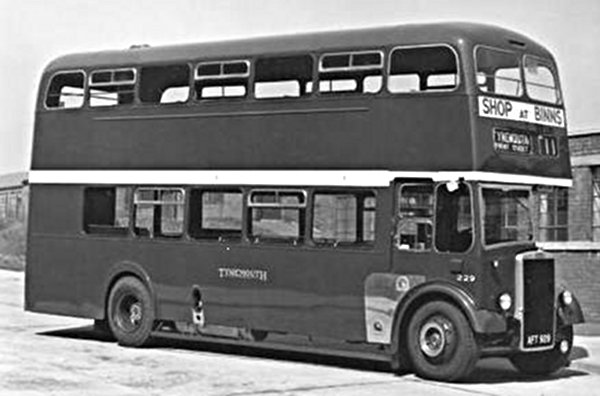In 1958, the Northern General Group took delivery of 53 Leyland PD3/4 vehicles. To the best of my knowledge, they were their first 30ft double deck buses; they were also the last rear entrance, although not the last half cabs, that particular label went to the Routemasters of 1963/4. I know a few half cabs were drafted in post NBC, but that was after the lunatics had taken control of the asylum.
The independence NGT allowed its subsidiaries in vehicle choice and specification has been discussed before on this site, and here is another example.
13 were ordered by Sunderland District Omnibus YPT 286 to 298; 286/298
They were primarily bought for use on SDO’s longer routes, and had Burlingham H41/32RD bodies, and very smart they looked in the understated Navy blue and white livery.
The remainder were all H41/32R MCW Orion bodies.
3 for Tyneside NNL 48 to 50; 48/50 Sage green and cream.
5 for Gateshead & District HCN 475 to 479; 75/79 Chocolate and cream.
20 for Northern YPT 825 to 484; 1825/1844 BET red and cream.
12 for Percy Main of which ten AFT 224 to 233; 224/233 for Tynemouth & District and two
AFT 234 and 235; 234/235 for Wakefields Motors Ltd. All twelve in BET red and cream.
I think its fair to say that the Orion would not be everyone’s first choice for favourite body, and the least said about the early ones the better. However, lessons were learned and these 1958 versions were a vast improvement on those on the earlier Guy Arab’s and Leyland PD2’s. As was the practice with Gateshead and District, theirs had a Newcastle Corporation style destination layout, but that and different liveries apart, outwardly, all the Orion’s looked to be pretty much the same. The interiors were finished in brown with Rexene covered seats. However, the 12 for Percy Main were finished to a much higher interior specification, as well as a different colour, ‘green’ they had moquette upholstered seats. Shortly after delivery, the front number plates were moved from the radiator to the front panel below the windscreen. AFT 930, had an extended life as a driver training vehicle, and I’m pleased say that it has survived into preservation, and is currently in the extremely capable hands of North East Bus Preservation Trust Ltd where it is undergoing extensive restoration. There was also a Sunderland District Omnibus example ‘YPT 289’ which was listed as awaiting preservation, but it seems to have dropped off the radar, does anyone know anything about it?

AFT 229 fleet number 229 is pictured above round the back of Percy Main depot, and looks to have just arrived from MCW, but in fairness, their vehicles were always well turned out, but this was in an age before ‘pride’ became an outdated idea that was surplus to requirements.
Ronnie Hoye
01/2016
28/01/16 – 09:55
‘The front number plates were moved from the radiator to the front panel below the windscreen’.
I have often wondered why, when the majority of operators were content to have the front number plate in the traditional position below the radiator, some chose to locate them in odd places.
Below the cab windscreen might have been something to do with better visibility than down at ground level. But why have them up on the waistrail, beneath the destination indicator? Southdown had consecutive batches of buses in this period with number plates ‘up there’ and blow the radiator. So there seems to have been no company policy.
And Barton was famous for putting adverts down below the radiator ‘Parcels by Bus’, for example, with the number plate high up on the body. Clearly, they weren’t worried about road dirt obscuring the number plate, as it would have been their own advert that would have been obscured.
Was it to do with identification of buses in the depot? Then surely prominent fleet numbers would have been the answer and operators have total control of where these are sited.
Does anybody here know the reason ?
Petras409
28/01/16 – 11:39
Usually when operators moved the number plate from the radiator onto the bodywork it was to allow radiators to be swapped from one bus to another without having to swap the plate as well.
John Stringer
28/01/16 – 16:08
YPT 289 is included on the NEBPT’s list of preserved buses with a North-East connection, dated 27/2/14, and that seems to be regarded as the ‘current’ list. It’s given as awaiting restoration, with owner Ritchie, Peterborough.
Is there reason to suspect that its status has recently changed?
David Call
29/01/16 – 07:11
I find it fascinating to note the allocated registration series of these buses. Clearly Northern General allowed it’s subsidiaries to use their local office for their particular batch, so we have, AFT, HCN, NNL, and YPT. One (AFT) is just starting a three letter forward series, one (HCN) is about a third through, one (NNL) just over half-way, and the other (YPT) is the last in a forward series, about to start reverse issues. Quite fascinating when all these issuing offices were in the same area! No doubt that all changed in the 1974 sort-out.
Michael Hampton
29/01/16 – 17:35
Yes Michael, prior to 1974, apart from vehicles acquired by way of a takeover, all vehicles new to United, were registered in Darlington ‘HN’, whereas NGT group vehicles were registered in several different authority areas. Vehicles new to Tyneside were Northumberland ‘JR-NL or TY’ Tynemouth & District and Wakefields Motors were Tynemouth ‘FT’. SDO were County Durham ‘PT or UP’ and Gateshead & District were Gateshead ‘CN’. A handfull of Northern vehicles were registered in South Shields ‘CU’ the remainder were all either Gateshead or County Durham. Strangely enough, Sunderland had two registrations, ‘BR & GR’ but neither seem to have been used by the NGT Group
Ronnie Hoye
Leave a Reply